In June, we agreed to lead the latest investment round in pioneering organic waste upcycling business Sanergy, a company transforming how fast-growing cities in the developing world manage waste by upcycling it into high value agriculture and energy products.
Between 702 and 828 million individuals around the world faced hunger in 2021; roughly equivalent to one in 10 people. Based on the middle of this projected range (768 million), 46 million more people were affected by hunger in 2021 compared to 20201.
The issue has been exacerbated by the enduring effects of the Covid-19 pandemic, coupled with the ongoing conflict in Ukraine – which has affected global exports of wheat (30%), maize (20%) and sunflower seed products (80%), as well as impacting supplies of fertiliser and energy prices2.
This crisis has intensified the issue of food shortages amongst the world’s poorest, heightening the importance of protecting food security globally. Even more so considering the significant progress still to be made when it comes to society’s ability to meet the targets of the second UN Sustainable Development Goal (SDG2) by 2030 – to end hunger, achieve food security and improved nutrition, and promote sustainable agriculture.
Building thriving communities
At Anglo American, our Sustainable Mining Plan helps us be a catalyst for change. Our commitment to creating a healthy environment and building thriving communities around our operations was behind our decision to lead the latest investment round of Sanergy Inc., an industry leader in manufacturing sustainable agricultural inputs from the safe management of residual organics, which pose an environmental and public health threat to emerging economies.
A zero-waste, closed loop solution
Centred on a zero-waste, closed loop solution, Sanergy is striving to tackle concerns around food security with a pioneering approach that seeks to solve a triple challenge; the need to feed a growing population by tackling insufficient agricultural yields, improve farmers’ livelihoods in a way that is sustainable and protect the environment through the safe management of residual organics.
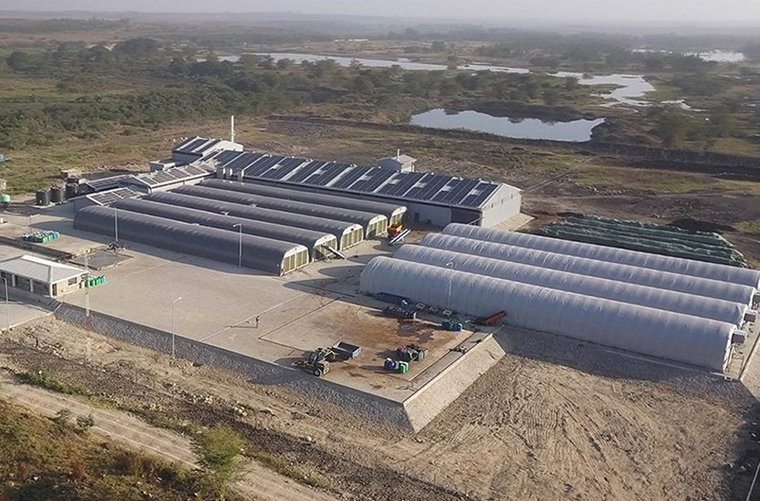
From the heart of Nairobi’s dense informal settlements to the centre of the city’s business districts, Sanergy has built an extensive logistics network that effectively collects and removes residual organics from agribusinesses, abattoirs, vegetable markets, and biosolids. The company has the capacity to remove more than 70,000 tonnes of waste every year, all of which is transported to a central processing facility, where it is treated and converted into usable by-products like insect-based protein for animal feed, organic fertiliser for regenerative farming and biomass fuel for sustainable, localised power sources. These by-products are then used to tackle broader societal issues.
Waste not, want not
Sanergy’s zero-waste approach is founded on the principles of the circular economy, and contributes to protecting human health and reducing environmental emissions, while at the same time promoting sustainable agriculture and creating local jobs along the value chain.
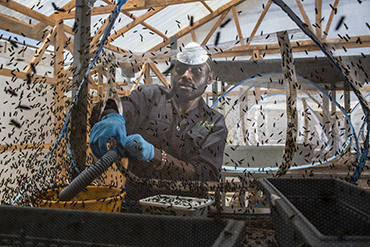
One of the outcomes of this approach is an insect-based animal feed, produced via Sanergy’s colony of black soldier flies, whose larvae feed on the organic waste that has been collected and removed, before assimilating it in their bodies as protein and fat. Harvested, washed, and pasteurised to remove pathogens, the larvae are then sold to animal feed millers who use them to make sustainably produced, nutrient-rich animal feed.
This is important because Kenya’s feed millers have to contend with depleting stocks of fishmeal, the primary source of protein in animal feed, unsustainably harvested from the country’s lakes, with massive variation in quantity and quality. The industry produces 750,000 tonnes of animal feed per year, which equates to about 60% of the required supply3, with Sanergy’s input key to improving capacity.
Fertiliser is another by-product, made by combining frass residue from the black soldier fly production process with carbon sources from plant waste. This mixture is converted into a high-quality compost, in a process that takes around four to six months. This is critical, with the Kenyan Ministry of Agriculture identifying soil degradation as a serious factor affecting food security in the country and recommending that farmers use up to 10 tons of organic fertiliser per hectare to restore soil health.
Sanergy sells these products to Kenyan farmers who have seen as much as a 30% increase in crop yields and animal weight – helping them become more commercially sustainable.
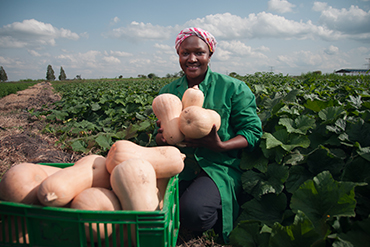
By implementing a training programme for agrovets in its distribution network – those running end-to-end supply stores for farmers – Sanergy has also improved the business prospects of more than 180 female-led, existing and new agrovets. Coaching them in sales techniques, such as how to develop leads and connections, as well as educating them on the benefits to farmers of using its products, Sanergy has enhanced their ability to make sales. Education and resources have also been shared with female smallholder farmers, who are often not the household decision makers4.
The company produces clean fuel in a briquette format too, processed through the compression of organic residuals. This fuel is used to meet the significant energy needs of some of its factories, as well as being distributed to local industries; particularly factories with boilers and steamers.
Sanergy sells 8,000 tons of fertiliser annually, reaching more than 6,000 farmers. It has a presence in 40 counties across Kenya, with more than 10,000 tons of CO2 offset by its operations to-date. Today, the company employs over 400 people, with 60% of its workforce living in the communities it serves.
Scaling Sanergy’s impact
Led by our Energy Solutions team, our work with Sanergy will also support our customers in advancing their plans for the transition to a lower carbon economy.
As well as supporting Sanergy’s expansion plans, our investment will be used to validate the company’s waste capture and conversion process with respect to its emissions reduction potential, thereby facilitating access to the international carbon markets. This could unlock an additional revenue stream for Sanergy to fund its future growth and expansion activities and, in turn, provide Anglo American with access to high-quality carbon credits.
Peter Whitcutt, CEO of Anglo American’s Marketing business, said: “There is growing consensus on the role carbon markets can play in driving positive behaviours around emissions reduction as part of integrated climate mitigation strategies.
“Sanergy is an example of how carbon markets can be a component for change, mobilising capital for projects and activities that capture and remove emissions while providing wider societal benefits. Its pioneering circular economy solution and waste treatment technology have the potential to directly support our goals of protecting health and wellbeing, and being a catalyst for creating sustainable livelihoods.”
Meet the team
David Auerbach, Co-founder – Sanergy
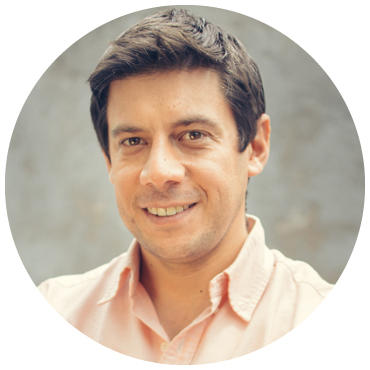
You and your co-founders were students at MIT. How did you go from there to building a company that provides regenerative agricultural inputs in emerging markets?
My co-founder and I connected over our first-hand experiences of living and working in different cities (India and China) that had similar systemic waste management and agricultural challenges as those impacting Kenya. At MIT, we (myself and co-founder, Ani Vallabhaneni) were challenged to develop a solution to this problem, which affects more than one billion people in the world today. Harnessing our combined experiences, we worked together to develop the closed loop circular economy solution Sanergy is known for today. We started in Kenya because, as a market, it has a tremendous demand for better agricultural inputs and waste management systems, with Nairobi specifically being an entrepreneurial hub with a vibrant, smart and innovative workforce who are excited to transform the country.
What has been your proudest moment since starting the business?
We are fortunate to have enjoyed several proud moments. Winning the Food Planet Prize in 2020 and being among the finalists in the first-ever Earthshot Prize in 2021 are key among the wins we have had. In addition, seeing different Kenyan government stakeholders endorse our work as having a positive and sustainable impact has been great. Above all, building a committed team of 400+ people who serve over 6000 farmers with our products and services is our proudest achievement.
What do you think is the biggest misconception people have of your business and how do you tackle it?
Thinking differently about waste is crucial. Businesses, governments and even citizens must think about their waste differently. It’s not a problem, but an opportunity. The majority do not know what to do with it, and so it goes to landfill or is never treated. Sanergy offers a different approach; one that allows the waste to be processed into valuable agricultural products used to nourish our soils and livestock.
What does the future look like for Sanergy?
Our circular economy model is ripe for scale. As emerging economies continue to expand, Sanergy is well positioned to manufacture agricultural inputs that aid farmers to produce more and to sustainably enhance food security. Our work with Anglo American in the carbon markets will help accelerate our business and mitigate climate change.
Agatha Kihiu, Plant Manager – Sanergy
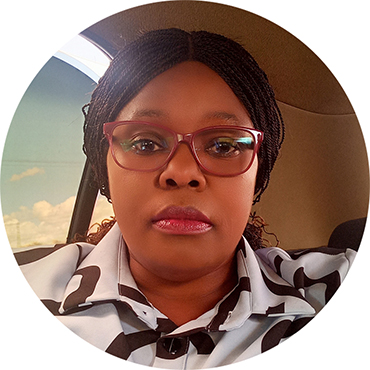
When did you join Sanergy and what was it that drew you to the company?
I’ve worked in the manufacturing and production space for more than 15 years, including at one of East Africa’s biggest milling companies. When I learned about Sanergy, I was inspired by the journey the company is on to solve some of the world’s more pressing challenges – using a sustainable, climate-conscious model – and joined in July 2021.
What does your job look like on a day-to-day basis?
My days are largely focused on developing and implementing systems that ensure the efficient production of our agricultural inputs, organic fertiliser and insect protein for animal feed. This includes ensuring smooth and continuous production, as well as collaborating with other units such as Quality; Health, Safety and Environment; Talent; Supply Chain and Maintenance to drive the plant’s production process optimisation.
What’s the biggest challenge you have had to overcome in your role and what have you learned?
During my tenure, I have learned that there is no limit to innovation and that collaboration is key for achieving the best results. One of my most memorable challenges relates to the management of windrows – a process of thermophilic composting used in the manufacture of organic fertiliser. Equipment breakdowns meant we were struggling to maintain efficiency. In solving this, we installed ground pipes to aid the process of moisturising the windrows. This solution has been a game-changer, improving efficiency from 32% to 95% and significantly increasing our fertiliser production volumes.
What are you most proud of from your time working at Sanergy?
I have worked with numerous young engineers within the company. My favourite aspect of the job is coaching and mentoring them, and transferring my knowledge and experience. By doing this, I hope to build a team that independently innovates and develops qualitative solutions to the production challenges we face, and to achieve optimum factory and production performance. This is something that makes me feel incredibly proud.
Anne Casamento, Emissions Reductions and Trading Manager, Energy Solutions – Anglo American
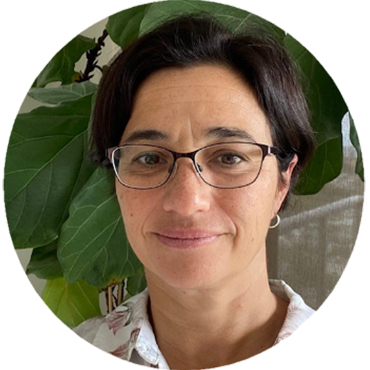
What’s your background and what attracted you to joining Anglo American?
My background is in Energy Trading and Carbon Risk Management, where – as a self-confessed energy geek – I’ve been fortunate to have spent more than 20 years developing my expertise; travelling the world, visiting all sorts of power stations and mining sites to help them develop innovative responses to climate change, and sustainability problems. My work encompasses anything from developing value in use models, and energy hedging and trading contracts to, as with Sanergy, investment in new technologies and processes that can assist corporations in reaching their climate change objectives.
Tell us about your role at Anglo American?
I joined Anglo American’s Marketing business in September 2021, and work as part of the Energy Solutions team in Singapore. My role is to develop our trading capabilities and understanding of the role that the different energy and carbon markets can play – not just in terms of our strategic goals and ambitions as a business, but also those of our core customers, who are on their own decarbonisation journeys.
How did you learn about Sanergy?
I first learned of Sanergy about five years ago from a friend of mine, who was telling me about the potential of the circular economy for the management of residual organics and knew them through her networks. Having never heard of such a thing I spent the next few days researching the entire concept and the rabbit warren that is the closed looped circular economic benefits of reducing human waste. This led me to Sanergy, and I have been following the organisation’s growth and development ever since. After seeing David on the news at the Earthshot Prize in 2021, I gave my friend a call to ask for an introduction and, within a month, we were in discussions with the Sanergy team about how we might work together. The partnership has grown from there.
What are you most excited about when it comes to this collaboration? Can you outline the opportunity as you see it?
It has always been my philosophy that the way we tackle climate change is to fundamentally think differently about how we solve some of the world’s more pressing challenges – using a sustainable, climate-conscious model. The circular economy approach Sanergy has developed is a prime example of that.
For Anglo American, the opportunity is mutually beneficial in that we can help accelerate Sanergy’s growth ambitions and ability to mitigate climate change, as well as leveraging the solution across the local communities we serve; some of which have issues with waste and sanitation. The by-products the company produces, from briquettes and fertiliser, to protein and carbon are all part of a suite of modern energy solutions that, in a carbon constrained world, we can use to positively impact society and the planet.
This strategic collaboration is just the beginning. As Ani and David say, ‘waste is not a problem, but an opportunity if you look at it the right way’. The opportunities here are boundless and I am looking forward to continuing on this journey, and to innovating together with the Sanergy team.
How are you going to bring your experience and expertise to bear?
My role will be to manage our collaboration with Sanergy and to act as a carbon advisor to them; bringing my expertise on how to monetise carbon in the ever-changing world that is the voluntary carbon markets. I will also help Sanergy to navigate potential opportunities across Anglo American’s various commodity groups, exploring opportunities to use the technology locally.
—–
Watch this short video to learn more about Sanergy and its approach. To understand the role the carbon markets can play as part of a broader, strategic decarbonisation approach, check out this interview with Tom Bell, Head of Strategy, Origination and Projects.
—–
1 The State of Food Security and Nutrition in the World 2022. Repurposing food and agricultural policies to make healthy diets more affordable. FAO, IFAD, UNICEF, WFP and WHO, 2022, https://doi.org/10.4060/cc0639en
2United Nations, Department of Economic and Social Affairs, Sustainable Development, Goal 2, Progress and Info, https://sdgs.un.org/goals/goal2
3 Waste into Value, Sanergy Inc., https://bit.ly/3TUmKS4
4 G-Search Case Study: Sanergy, https://bit.ly/3qeRAax






